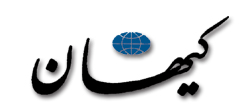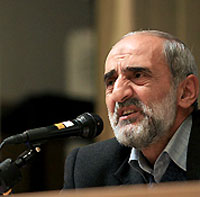December 27-2013
 The hardline editor of the ultra-conservative daily Kayhan, Hossain Shariat-madari, says negotiations cannot resolve the US-Iran conflict—that will only happen when one side or the other ceases to be.
The hardline editor of the ultra-conservative daily Kayhan, Hossain Shariat-madari, says negotiations cannot resolve the US-Iran conflict—that will only happen when one side or the other ceases to be.
Shariatmadari’s stunning views were voiced in an interview with The Washington Post’s David Ignatius, who discussed the interview in a column last Tuesday.
 On the Iran-US conflict, Ignatius quoted Shariatmadari as saying: “The identity of both sides is involved in this conflict. It didn’t ‘just happen.’ It is structural. The problem will be solved when one side gives up its identity—only then.”
On the Iran-US conflict, Ignatius quoted Shariatmadari as saying: “The identity of both sides is involved in this conflict. It didn’t ‘just happen.’ It is structural. The problem will be solved when one side gives up its identity—only then.”
It was a remarkably harsh assessment, illustrating the very uncompromising anti-foreign hostility of many hardliners like Shariatmadari.
It should also be noted by Saudi critics of the Big Six talks with Iran who believe the talks go far beyond the nuclear issue and are intended to create an Iranian-American alliance that would pitch Saudi Arabia into the abyss.
But the Kayhan editor doesn’t even want to see talks limited to the nuclear issue. He says he doesn’t think Iran should have signed the six-month interim deal negotiated last month in Geneva, and he argues that Foreign Minister Mohammad-Javad Zarif lied to President Rohani and Supreme Leader Ali Khamenehi when he said the deal guaranteed Iran’s right to enrich uranium. “This gentleman [Zarif] did not tell the truth,” Shariatmadari told Ignatius.
The interim deal says in plain English that the final agreement yet to be negotiated should provide for “a mutually defined enrichment program.”
Ignatius wrote, “An Iranian banker may have been right when he told me that ‘Zarif has the backing of 90 percent of the people’ to negotiate an agreement that removes economic sanctions and eases Iran’s isolation. But the vanguard represented by Shariatmadari and the Revolutionary Guard [Pasdaran] may hold the commanding heights.”
Ignatius noted that Rohani told him in an interview in September that he thinks security organizations, including the Pasdaran, should have less power in Iran. But when Ignatius asked Shariatmadari about Rohani’s view, Shariatmadari dismissed it as “election propaganda.”
Ignatius said the Iranian leadership may be allowing the public debate over the nuclear talks to simmer in order to boost its leverage in the negotiations — to encourage Western concessions to moderates in order to help them battle hardliners like Shariatmadari. But Ignatius said the debate “is not just for show: You can feel the underlying tension in ordinary conversation.”
A bigger question, of course, is whether Khamenehi agrees with Shariatmadari, who was named to his editor’s post decades ago by Khamenehi. Shariatmadari is routinely portrayed abroad as using Kayhan to voice Khamenehi’s views. But Shariatmadari’s opposition to the interim nuclear agreement, which has been publicly endorsed by Khamenehi, shows that isn’t always true.
Ignatius said he heard from a number of people in Tehran that they believe Khamenehi is supporting Rohani and his foreign policy because otherwise the system will collapse.
Ignatius said Shariatmadari is suspicious even of President Obama’s phone call to Rohani in September, which Shariatmadari saw as an attempt to demean Iran. Ignatius said he asked if Rohani should have hung up and Shariatmadari replied, with a smile, “We believe in politeness.”


















